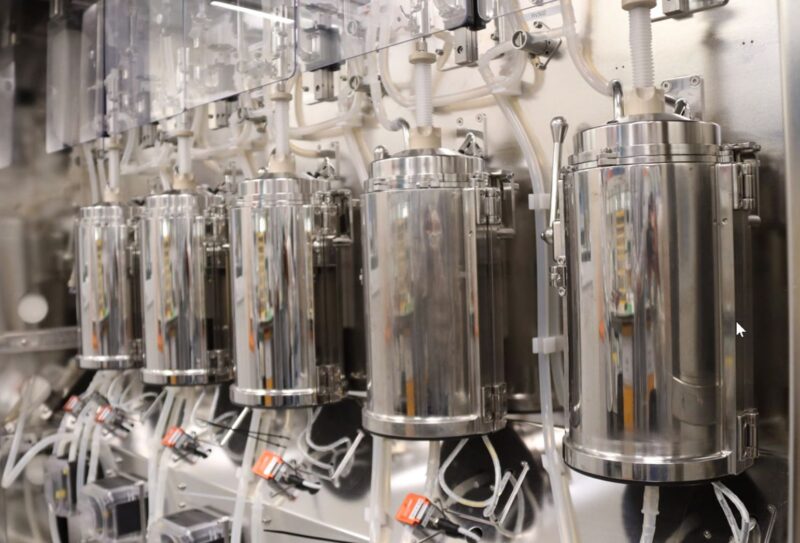Israeli startup Ever After Foods (formerly Plurinuva) has unveiled patented technology it claims can transform the unit economics of cultivated meat by reducing the capital expenditure required to build facilities and increasing the productivity of tissue production.
A spinoff from regenerative medicine company Pluri, Ever After Foods is backed by Israeli food co Tnuva Group. It works with adult stem cells from poultry eggs and cow placentas, but does not deploy genetic engineering to manipulate the cells, CEO Eyal Rosenthal told AFN.
“I’ve been following this market as an investor for years and there are more than 100 companies that can grow meat in a lab. But it’s still at nothing like the scale that is relevant for food, and 90% of the companies are using the same kinds of bioreactors that were never designed for food scale. We’re taking a different approach.”
“In less than a year, Ever After Foods developed a solution unlike any other in the market through massive technological advancements that evolved the original biotech-focused technology into a food-grade platform.” Yaky Yanay, CEO and president, Pluri
Ever After’s plants will require ‘significantly lower capital expenditures and lower production costs’
Rather than proliferating cells in large stir tank bioreactors, which Rosenthal argues are expensive and provide diminishing returns once you get above a certain size, Ever After deploys a two-stage approach in smaller packed bed vessels, and is planning a pilot facility in Israel next year.
First, cells grow on non-edible carriers, from which they are detached using mechanical force (patented vibrations technology). They are then transferred to production bioreactors where they seed onto edible scaffolding and differentiate and mature into meaty tissue.
According to Rosenthal, Ever After’s plants will require “significantly lower capital expenditures and [operate at] lower production costs, providing a 700% increase in productivity compared to other cultivated meat technology platforms. We can produce more than 10 kilos of cultivated meat mass with just a 35-liter production bioreactor and have a proven path to scale and reach price parity.”
He added: “An Ever After 1,400-liter bioreactor can produce 400 kilos of cultivated meat, whereas using competing technologies, you’d need a 10,000+-liter bioreactor to produce an equivalent amount. We have a huge cost advantage.”
‘You can get more tissue in the same space”
Although growing the cells on non-edible carriers in the initial phase might not sound like the best way to achieve high cell densities, the cells grow very efficiently and the vast majority can be harvested, CTO Dr. Barak Zohar told AFN. “The great thing with our system is that it protects the cells from shear stress.”
Stirring cells in large stir tank bioreactors (so they get the nutrients they need) can damage cells, while efficiency can also deteriorate with larger vessels, he claimed.
“Once you increase the size, productivity gets lower, and the physics are completely different. We have a very efficient system where cells continue to proliferate very efficiently in the final production stage [before they differentiate and mature into tissue], so we don’t need a lot of cells to seed in the propagation stage.”
He added: “The packed bed allows you to flow media through a path of tissue where it basically composes a column, so it’s much more suitable for a high solid-to-liquid ratio, so you can get more tissue in the same space.
“We’re also recycling our serum-free media, which allows us to reduce costs dramatically. Our system is very compact, so the total volume of the system is lower and more cost-effective in terms of media and supplements both for cell growth and differentiation.”
US is the ‘prime market’
In the first instance, Ever After Foods will launch its own cultivated meat products, with the US the “prime market” for testing in late 2024, said Rosenthal: “We’re planning to reveal the first product towards Q3 this year. It will be a whole cut type product, not nuggets or processed burgers.”
Down the road, however, Ever After hopes to serve as a technology enabler for the wider industry, he said: “We are looking to license our bioreactor technology.”
As for funding, he said, “We have [enough] money for the next two years.”
Asked about regulatory approvals, he said: “We’re in ongoing discussions in Israel and the US, where what regulators are looking for is much clearer with the approval for UPSIDE Foods,” which recently received a ‘no questions’ letter from the US Food and Drug Administration affirming the safety of its process for cultivated chicken, he said.
The deal with Tnuva
Tnuva invested $7.5 million in Ever After Foods (formerly Plurinuva) in early 2022 based on a $40 million pre-money valuation. Pluri has granted Ever After an exclusive global royalty-bearing license to use its IP and expertise in the field of cultivated meat.
Tnuva has exclusive rights to market Ever After’s products in Israel, but Ever After retains rights to out-license marketing of cultivated meat products in the rest-of-world.
GFI: High cell densities
Elliot Swartz, lead scientist, cultivated meat at nonprofit the Good Food Institute (GFI), which advocates for alternatives to animal products, told AFN: “It is difficult to verify any of the claims here, but a rough calculation for 10kg in a 35L bioreactor means that the cells are around a density of 90 million cells/mL, which is pretty high. I’m not aware of other cultivated meat companies using a fixed bed bioreactor approach.”
Tom Ben-Arye Cohen, senior scientist at the GFI in Israel, added: “This company has a very strong scientific and industrial background, both in bioreactor development, bioprocess and scaleup, and stem cell research, which makes their claims more credible.”





